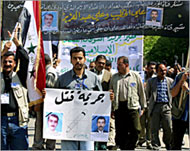‘A black year’ for journalists
Press freedom advocate Reporters Without Borders has described 2003 as a “black year” for journalists worldwide, with 42 reporters killed and more than 120 others still imprisoned.

“More journalists were killed in 2003 than in any year since 1995 … A black year if ever there was one,” Reporters Sans Frontieres (RSF) said in its annual report, released to coincide with World Press Freedom Day.
Forty-two journalists were killed “while doing their job or for their opinions, mainly in Asia and the Middle East [the Iraq war], compared with only 25 in 2002”, it said.
As many as 766 were arrested, at least 1460 were physically attacked or threatened and 501 media were censored, the Paris-based organisation said.
|
“Nearly a third of the world’s people live in countries without press freedom” |
“Nearly a third of the world’s people live in countries without press freedom.”
As of 1 April 2004, more than 120 journalists remained in prison, including 30 in Cuba, 27 in China, 14 in Eritrea and 13 in Myanmar.
Iraq casaulties
RSF bestowed on North Africa and the Middle East the mantle of having the worst record of press freedom in 2003, noting that 17 journalists were killed in the region beset by various abuses and reinforced self-censorship of the media.
 |
|
Protest in Baghdad triggered by |
“This was the region with least press freedom,” it said. “It had few independent media and journalists in several countries strictly censored themselves.”
Fifteen journalists and two media assistants were killed in the region, including 12 in Iraq, five of whom it said were slain by the “very aggressive” occupying US army.
Iran remained the region’s biggest jail for reporters in the Middle East, with 40 imprisoned during the year. One, Canadian-Iranian photographer Zahra Kazemi, died after being beaten by her jailers.
“Being a journalist in Iran or the Arab world often means not crossing the red lines set by the authorities if you want to avoid the repression of long-established dictatorships, authoritarian regimes or paper democracies,” RSF said.
Wrath of ageing regimes
RSF was damning in its report on Africa.
“Independent news media are becoming scarce throughout Africa and journalists continue to flee with a heavy heart.
“Journalists must face the wrath of ageing regimes clinging to power and protective of their authority. They all balk at liberalisation, especially when broadcasting is involved,” it said.
RSF blamed the increased risk in media work squarely on ongoing wars and intermittent fighting throughout the continent.
Two journalists were killed in Ivory Coast and a third probably executed in the Democratic Republic of Congo.
|
“No one needs reminding that North Korea has no idea what press diversity is and China discourages anything that is not propaganda” |
Turning to Asia, RSF said 16 journalists were last year killed in the region and at least 200 jailed, and in many cases tortured.
“Prison conditions were deplorable and torture was common practice.
“No one needs reminding that North Korea has no idea what press diversity is and China discourages anything that is not propaganda,” it said, adding that 190 regional news media were hit by censorship.
Grim conditions
 |
|
Indonesian reporters protest |
Working conditions for journalists in much of the former Soviet Union remained grim, more than a decade after the break-up of the totalitarian superpower.
Media freedoms in most countries of the Commonwealth of Independent States (CIS), which includes all but the Baltic former Soviet republics, are only deteriorating, RSF said.
Conditions for journalists are especially harsh in Belarus, Kazakhstan, Russia, Turkmenistan and Uzbekistan, whose presidents are included on RSF’s media “predator” list.
The 10 nations in eastern Europe and the Mediterranean that joined the European Union at beginning of May largely respected press freedom during 2003.
Cyprus, the Czech Republic, Estonia, Hungary, Latvia, Lithuania, Malta, Poland, Slovakia and Slovenia “respected press freedom.
|
“Laws punishing defamation and perceived insults frequently hampered journalists in their work and gave undue protection to the authorities” |
But in most of them, laws punishing defamation and perceived insults frequently hampered journalists in their work and gave undue protection to the authorities,” RSF said.
“No journalist in the region was murdered in 2003 because of their work,” RSF said, criticising authorities in EU candidates Romania and Turkey for harassment of journalists.
In the Balkans, advances in press freedom “remained fragile”, it said.
As for the Americas, RSF said a “lopsided division endured.
Press freedom is generally respected in most countries, but is violated every day in Cuba, Haiti and Colombia”, the latter of which saw four journalists killed in 2003.